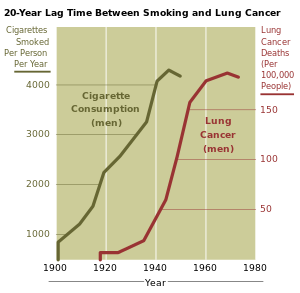Investigators from New Zealand recently got widespread media attention for a study contradicting Tashkin's results. "Heavy cannabis users may be at greater risk of chronic lung disease –including cancer– compared to tobacco smokers," is how BBC News summed up the New Zealanders' findings.
(extract from http://www.alternet.org/healthwellness/142271/smoking_marijuana_does_not_cause_lung_cancer/?page=entire )
The very small size of the study –79 smokers took part, 21 of whom smoked cannabis only– was not held against the authors. In fact, the small New Zealand study was given much more coverage by the corporate press than the large UCLA study that preceded it.
 Image via Wikipedia
Image via Wikipedia
Tashkin criticized the New Zealanders' methodology in his talk at Asilomar: "There's some cognitive dissonance associated with the interpretation of their findings. I think this has to do with the belief model among the investigators and –I wish they were here to defend themselves– the integrity of the investigators… They actually published another paper in which they mimicked the design that we used for looking at lung function."
Tashkin spoke from the stage of an airy redwood chapel designed by Julia Morgan. He is pink-cheeked, 70ish, wears wire-rimmed spectacles. "For tobacco they found what you'd expect: a higher risk for lung cancer and a clear dose-response relationship. A 24-fold increase in the people who smoked the most… What about marijuana? If they smoked a small or moderate amount there was no increased risk, in fact slightly less than one. But if they were in the upper third of the group, then their risk was six-fold… A rather surprising finding, and one has to be cautious about interpreting the results because of the very small number of cases -- fourteen— and controls -- four."
Tashkin said the New Zealanders employed "statistical sleight of hand." He deemed it "completely implausible that smokers of only 365 joints of marijuana have a risk for developing lung cancer similar to that of smokers of 7,000 tobacco cigarettes… Their small sample size led to vastly inflated estimates… They had said 'it's ideal to do the study in New Zealand because we have a much higher prevalence of marijuana smoking.' But 88 percent of their controls had never smoked marijuana, whereas 36% of our controls (in Los Angeles) had never smoked marijuana. Why did so few of the controls smoke marijuana? Something fishy about that!"
 Strong words for a UCLA School of Medicine professor!
Strong words for a UCLA School of Medicine professor!
As to the highly promising implication of his own study –that something in marijuana stops damaged cells from becoming malignant— Tashkin noted that an anti-proliferative effect of THC has been observed in cell-culture systems and animal models of brain, breast, prostate, and lung cancer. THC has been shown to promote apoptosis (damaged cells die instead of reproducing) and to counter angiogenesis (the process by which blood vessels are formed —a requirement of tumor growth). Other antioxidants in cannabis may also be involved in countering malignancy, said Tashkin.
 Of course, a certain 'anti-cancer in society public speaker" standing on Christchurch's High Street this afternoon, brought this, and more, to the notice of an engrossed public gallery. All while the 'city ambassadors' continued to ask said offending soapboxer to cease 'standing on the furniture'. The Police were called. The right to stand on the furniture was upheld. As was the right to be anti-cancer!
Of course, a certain 'anti-cancer in society public speaker" standing on Christchurch's High Street this afternoon, brought this, and more, to the notice of an engrossed public gallery. All while the 'city ambassadors' continued to ask said offending soapboxer to cease 'standing on the furniture'. The Police were called. The right to stand on the furniture was upheld. As was the right to be anti-cancer!Blair Anderson ‹(•¿•)›
ph (643) 389 4065 cell 027 265 7219







No comments:
Post a Comment